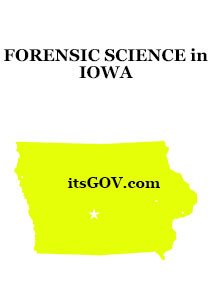Forensic Science
Forensic science combines science and investigation in order to aid and support the prosecution or defense in criminal and civil investigations. While the profession has been widely romanticized by various TV shows, make no mistake – this job is most likely different that you expect. In contrast with popular perception, this is a highly scientific role, which often involves detailed, painstaking work. Field duties are limited to a few areas of expertise, and most often than not a forensic scientist will spend his time in the lab.
If you made it this far, though, congratulations! You’re taking the first steps in joining a very rewarding profession and itsGOV is here to guide you through what you need to know and what you need to do to join a forensic science program in.
Depending on the type of forensic science practiced, different degrees and educational backgrounds may help a candidate get a job and excel in this field. Regarding formal education, requirements vary across jobs, but you should definitely have a solid background in mathematics, biology and chemistry.
The National Institute of Justice, a division of the U.S. Department of Justice, offers guidelines for model undergraduate and graduate forensic science degree programs. According to the American Academy of Forensic Science, strong programs should offer a curriculum that concentrates on scientific writing, laboratory skills, public speaking, and computer software application training.
The Maine State Police Crime Laboratory, which was created in 1926, provides forensic services to all law enforcement agencies working in the State of Maine. Using state-of-the-art equipment and instrumentation, the forensic scientists of the Crime Laboratory compare evidence collected from crime scenes through its four sections:
- Forensic Chemistry
- Forensic Biology
- Firearms/Toolmarks
- Latent Prints
Forensic scientists in Maine conduct scientific analyses in the following forensic disciplines:
- DNA analysis
- Fingerprint and palm print comparisons and identification
- Fire debris analysis
- Firearms examinations
- Footwear and tire comparisons and identification
- Gunshot residue and distance determination
- Physical matching comparisons and identification
- Serial number and VIN restoration
- Serological screening and bodily fluid identification
- Toolmark examinations
- Trace evidence identification and comparison
Forensic Science Requirements in Maine
Forensic science degrees prepare students to become forensic scientists who are called upon to examine and evaluate physical evidence using instrumental, chemical and physical methods of analysis. Both undergraduate and graduate degrees in forensic science prepare students to serve as expert witnesses in court hearings and conduct research on new technologies, equipment, and techniques.
Forensic Science Training in Maine
Undergraduate Level – A bachelor’s degree in forensic science provides students with competency in the following areas:
- Crime scene processing
- Evidence documentation and preservation
- Justice system
- Presumption and confirmatory testing of forensic samples
- Judicial and courtroom procedures
- Research and analytical methods
Graduate Level – Students seeking specialized training in the field of forensic science commonly seek a Master’s in Forensic Science. Some of the tracks within a master’s degree include: toxicology, drug analysis, forensic anthropology, forensic medicine, criminalistics, biological evidence, and forensic DNA analysis, among others.
Individuals who want to learn how to become a forensic scientist at an entry level must possess a bachelor of science in one of the following fields:
- Chemistry
- Biochemistry
- Medical laboratory science
- Molecular biology
Individuals who want to achieve forensic scientist jobs in DNA analysis must also complete coursework in the following:
- Biochemistry
- Genetics
- Molecular biology
- Statistics/Population genetics
Forensic Science Salary in Maine
Data from the Bureau of Labor Statistics (BLS) shows that forty people worked as forensic science technicians in Maine in 2012. Their annual median salary was $42,440 with scientists in the top tenth of their wage bracket making an average of $59,060 a year.
One primary employer for forensic scientists in Maine is the Crime Lab of the Maine State Police. The lab investigates 800 to 1,000 cases a year. Some of the analyses that scientists perform at this lab include:
- DNA comparisons
- Fingerprint and tire track comparisons
- Fire debris analysis
- Sexual assault tests
- Weapons examinations
The forensic scientist occupational category includes both lab technicians and crime scene investigators (CSIs) who work at the scene of the crime. The primary CSIs in many states are civilians who work for law enforcement agencies or independent forensic labs.
In Maine, though, investigators and officers from the Maine State Police perform much of the crime scene investigation work. They are primarily based out of Bangor and Portland.
While many CSIs have specialties such as latent fingerprint or impression analysis, most of Maine’s CSIs are trained as generalists. They have a working knowledge of a wide range of forensic science. According to Indeed.com, the average salary for a crime scene investigator in the state in the year leading up to October 2013 was $49,000 a year.
Forensic Science Schools and Colleges in Maine
Bachelor’s Degree Programs in Maine
| University | Thomas College, Forensic Psychology B.S. |
| Duration | 24 months |
| Type | Full time, Part time |
| Tuition and fees | $33,560 per year |
| Program link |
| University | Husson University, Forensic Science B.S. |
| Duration | 24 months |
| Type | Full time, Part time |
| Tuition and fees | $31,434 per year |
| Program link |
Master’s Degree Programs in Maine
There are currently no master’s programs offered in Maine.




